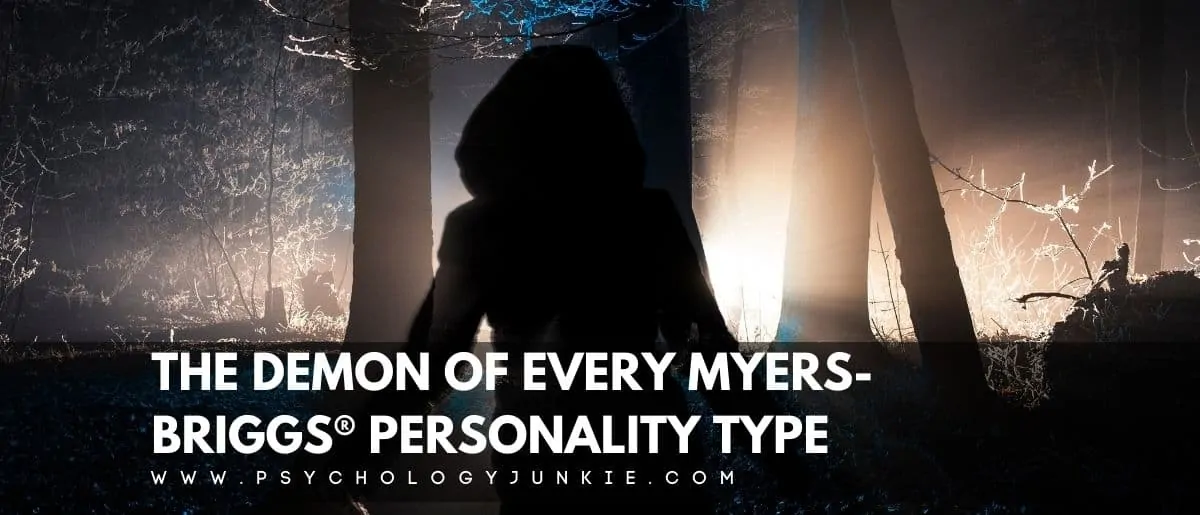The Demon of Each Myers-Briggs® Personality Type
Want to deep-dive into the source of some of your worst weaknesses? Today we’re going to explore the “Demon” function of each personality type in the Myers-Briggs® system. The Demon is the last function in your cognitive function stack and a background player in many of your biggest mistakes. However, on the flip-side, the demon can be a catalyst for incredible growth and transformation.
Whoah, I’m new to type! What is this?
If you’ve just figured out your four-letter type code then this article might be a bit intense for you. You might want to read De-Coding Your Myers-Briggs® Personality Type Code first, or The MBTI: A Guide for Busy People

But if you’re ready to dive into the deep-end of typology, then, by all means, read on!
Estimated reading time: 23 minutes
Table of contents
- Whoah, I’m new to type! What is this?
- What is the Demon?
- This is just the beginning
- The Demon of Each Myers-Briggs® Personality Type
- The ENFP and ENTP Personality Types – Demon Extraverted Sensation (Se)
- The ESFP and ESTP Personality Types – Demon Extraverted Intuition (Ne)
- The INFJ and INTJ Personality Types – Demon Introverted Sensation (Si)
- The ISTJ and ISFJ Personality Types – Demon Introverted Intuition (Ni)
- The ESTJ and ENTJ Personality Types – Demon Extraverted Feeling (Fe)
- The ESFJ and ENFJ Personality Types – Demon Extraverted Thinking (Te)
- The ISTP and INTP Personality Types – Demon Introverted Feeling (Fi)
- The ISFP and INFP Personality Types – Demon Introverted Thinking
What is the Demon?
The demon is the last function in your cognitive function stack. The cognitive functions are eight unique mental processes that help you to understand the world and make decisions. Each of the 16 Myers-Briggs® personality types excels at some cognitive functions and struggles with others. Just like most of us have one hand we can use more easily than the other, each personality type has certain cognitive functions that come more easily to them than to others.
Here’s an example of a cognitive function stack below. The functions in the “primary stack” are the most valued. These are the ones we accept as part of ourselves and consciously recognize in our lives. The functions in the shadow function stack are less conscious to us and we’re unlikely to recognize them as part of ourselves. We don’t value them to the extent that we value the functions in our primary stack.
INFJ Function Stack
Primary Functions:
Dominant Function: Introverted Intuition (Ni)
Auxiliary Function: Extraverted Feeling (Fe)
Tertiary Function: Introverted Thinking (Ti)
Inferior Function: Extraverted Sensing (Se)
Shadow Function Stack:
Opposing Role: Extraverted Intuition (Ne)
Critical Parent: Introverted Feeling (Fi)
Trickster: Extraverted Thinking (Te)
Demon: Introverted Sensing (Si)
The demon is essentially our inferior’s inferior function. It feels the most “other” of all our functions and our failures in this area tend to be the most undermining. We may struggle with relating to people who use this function in the dominant position, because our experiences with it are so negative and because we don’t connect with it consciously except in very rare, disquieting cases. We may project “the demon” onto other people who are using this function in an obvious way. It’s important to recognize when we’re projecting this function so we don’t misunderstand or demonize others for using a function in a normal/healthy way.
The demon can also be a hidden “savior” in our lives. We may use the demon to undermine or hurt others when they’ve hurt us. It can be the source of an unexpected comeback when we feel we’re being attacked – especially unfairly.
“The Demon is what we need to be ashamed of-the flaw in our character for which integrity exists and is needed.”
– John Beebe
The Demon can also be a source of great transformation. When we learn to recognize its power and potential we can grow as people and be more accepting, open-minded, and self-aware.
So without further ado, let’s explore the demon function of each personality type.
This is just the beginning
We’re just touching on the demon function in this article. You can find out much more in Depth Typology by Mark Hunziker, or Energies and Patterns in Psychological Type by John Beebe.
The Demon of Each Myers-Briggs® Personality Type
The ENFP and ENTP Personality Types – Demon Extraverted Sensation (Se)
Extraverted Sensation is skilled at noticing everything that’s happening in the present moment. It is attuned to details, experiences, and realities. It can accurately assess what’s happening without getting lost in reflections or theories. Se-dominant personality types (ESPs) have a knack for staying in the present, responding to surprise information or tasks, and maneuvering the physical world around them.
ENFPs and ENTPs tend to fixate on possibilities and theoretical ideas. The present moment is a springboard for dozens of related ideas and random connections. More than experiencing the world as it is, they imagine the world as it could be. Things are meant to be transformed and changed – not enjoyed statically. When forced to focus purely on the present and react to it in a practical way, ENPs can feel limited and angry. They want to extrapolate – not accept as is. Fixating on concrete details is a constant struggle for ENPs. They don’t tend to notice all the details of what’s around them as much as they notice impressions and possibilities.
How Lack of Se Can Show Up:
Because of a lack of Se, ENPs may find themselves crashing headlong into the detailed realities of life on a regular basis. They might be in the midst of pursuing an incredible idea when they realize they don’t have the resources available or the money to get said resources. Or they might verbalize a tangent of ideas and theories in a situation when a relevant, immediate, practical solution is desperately needed.
How Demon Extraverted Sensation Shows Up During Strenuous Times:
In a destructive way, ENPs may inflate Se when they’re at their worst emotionally or mentally. When this happens, they become impulsive and reckless – throwing caution to the wind. They may “give up” on restraint and pursue hedonism in the form of binge-eating, drinking, drug use, or sensory stimulation. They may also suddenly, inexplicably be able to use the immediate environment and reality to attack others. For example, they might suddenly be able to point out dozens of realities that undermine or shame another individual. They might perplexingly be able to speed down the road, avoiding any obstacle in their path, with a laser-like focus on their current environment. In a desperate situation, they might zero in on details, hastily acting on them in a disjointed, messy way.
ENPs may project demonic Se onto other types who are using Se. Because they experience it in a hedonistic, destructive manner, they may see Sensing-Perceiving types as inherently hedonistic or destructive.
The Positive Side of Demon Extraverted Sensation:
When ENPs learn to accept and recognize Se as part of themselves, they become more grounded in their thinking. They learn to notice what’s immediately relevant rather than trailing off into a flurry of possibilities. They become more in touch with reality and the facts at the forefront of their ideas. They appreciate the moment for what it is rather than trying to transform it. There’s a wellspring of enjoyment that can be had for ENPs when they stop seeing Se as something to avoid or something “evil” that only comes out when they’re at their worst. They can also form deeper bonds with SP personality types.
The ESFP and ESTP Personality Types – Demon Extraverted Intuition (Ne)
Extraverted Intuition explores connections and relationships between things that are happening in the outside world. It is also focused on extrapolating new possibilities, seeing things in new ways, and generating alternatives and multiple options. Ne-dominant types (ENPs) are gifted at brainstorming, picking up on seemingly random relationships, and innovating.
ESFPs and ESTPS tend to fixate on realities and details rather than hypothetical possibilities or abstract connections. The world of the now is the real world to them, rather than the world of “someday.” They want to be secure on the facts and details of what’s happening around them rather than generate possibilities on things that, as of now, don’t exist. Hypothesizing and predicting can feel too risky because so much of life is changing at a constant pace.
How the Lack of Ne Can Show Up:
ESPs can wind up in precarious or difficult situations because they haven’t spent time reading between the lines enough. Because they didn’t see a hidden meaning or connection they may fail to see how one of their actions set off a series of other reactions that led them onto a path that they never wanted to be on in the first place. They may feel stuck when life turns out poorly, not seeing a situation beyond the present or a possibility outside of their present pain or the “facts” that can’t be changed.
How Demon Extraverted Intuition Shows Up During Strenuous Times:
In a destructive way, ESPs may inflate Ne when they are feeling at the end of their rope. During times like this, they misinterpret the meaning of someone’s actions and project negative intentions where there weren’t any. They may suddenly have dozens of hypothetical possibilities and connections in their mind that all seem to lead in negative directions. They might get lost in conspiracy theories or rabbit trails of destructive thought rather than staying as grounded as they typically are. When in the energy of the dominant function (Se), ESPs appear confident and focused. When in the energy of the Demon (Ne), ESTPs appear confused, random, and scattered. Instead of focusing on what’s real and tangible and provable (Sensing), they appear less focused, realistic, and pragmatic.
ESPs might project Demonic Ne onto other types who use Ne. They might assume that NP types are scattered, unrealistic, and destructive simply because that’s how they feel when they experience Ne.
At the moment of their most intense desperation, ESPs might inexplicably be able to use Extraverted Intuition adeptly. When this happens they might suddenly visualize a potential solution just at the nick of time. They might creatively work with abstract ideas, seeing a connection between one event or situation and another and developing a clearer insight into the relationship and connections between things and how to solve a problem or move forward in life. They may also be able to produce retaliatory attacks on others who are unfairly targeting or shaming them, bringing up connections and inferences that dismantle their attacker’s accusations or spiteful remarks.
The Positive Side of Demon Extraverted Intuition:
The Demon isn’t always bad. Once ESPs learn to accept Ne and give space to its insights they can explore more possibilities, see more hidden connections, and evaluate future possibilities more accurately. They can also form deeper bonds with NP personality types.
The INFJ and INTJ Personality Types – Demon Introverted Sensation (Si)
Introverted Sensation reviews and recalls past experiences and applies any learned lessons to the current moment. It digs deeply into information and data and reflects on impressions that that data provides. Si-dominant types (ISJs) enjoy having a routine, a sense of stability, and repeating experiences and rituals that they’ve come to love throughout life. They crave a physically comfortable, calm life.
INFJs and INTJs tend to fixate on how things will unfold in the future. They are driven by their intuitions and a sense of how things will ultimately play out. INJs are future-forecasters – they want to consider how things will transform over time. They are also focused on concepts and theories – more interested in why things exist than the details of their current existence.
How the Lack of Si Can Show Up:
INJs may quickly forget details, even if they’re trying to remember them. For example, they may drive to the same place a dozen times but still need to use their GPS to get there. They may forget names, dates, the way a room was decorated, or the phone number of a dear friend. They also tend to focus so much on abstract ideas that they lose sight of their physical needs. They may experience muscle aches and pain from lack of concern for their body. While other types might immediately stretch when they are sore or get a drink when they are thirsty, INJs tend to be oblivious to these things only to experience debilitating physical effects later.
How Demon Introverted Sensation Infiltrates INJs During Strenuous Times:
When INJs are feeling extremely vulnerable or destitute, they can end up replaying all their worst past experiences and failures. They may recall their most embarrassing moments or their biggest mistakes on a mental loop. They can also suddenly become hyper-aware of every physical ache and pain in their body, becoming overwhelmed by irritation and agony about hurts they had been oblivious to before.
When retaliating against others, INJs might be able to inexplicably recall someone’s past failures in astounding detail. Embarrassments or mistakes that they might ordinarily be hesitant to verbalize will be laid bare to put the other person in a state of vulnerability or shame. In essence, the INJ is passing off their own vulnerability to another person that is making them feel shame or vulnerability. This can be shocking for others to experience because they might have previously considered the INJ blind to these failures or embarrassments.
INJs might project demonic Si onto other types who are using Si. Because INJs experience Si in a destructive, self-defeating, debilitating way, they may view Si-users (SJs) as destructive, self-defeating, or debilitating.
The Positive Side of Demon Introverted Sensation:
There are times when INJs are unfairly being put into a vulnerable situation. When this happens, demon Si can come into play just in the nick of time, making the other person aware of their own hypocrisy or the facts they are forgetting. When INJs recognize Si as a potentially beneficial part of themselves, they learn to appreciate lessons from their past experiences and the power of traditions, routines, and physical attentiveness. They can also form deeper bonds with SJ personality types.
The ISTJ and ISFJ Personality Types – Demon Introverted Intuition (Ni)
Introverted Intuition is focused primarily on foreseeing implications, effects, and transformations. Ni-dominant types (INJs) are gifted at predicting how things will evolve over time. They are primarily focused on the ripple-effects of everything happening around them.
ISTJs and ISFJs enjoy working with what they know, revisiting favorite experiences, and trusting tried-and-true methods. These types thrive when they have a consistent routine and a stable, secure life. More than forecasting about the future, they relish recalling past experiences and wisdom that has supported them through life. They’d rather deal with facts and concrete data than theories or abstractions.
How Lack of Ni Can Show Up:
Blindness to Introverted Intuition can show up in ISJs getting stuck in a rut, not seeing where things will lead, or not being able to accurately anticipate future events. They might get so fixated on repeating comfortable routines that they get stuck in a frame of mind and a lifestyle that they should outgrow. They may also be impatient when dealing with abstract or conceptual subjects.
How Demon Introverted Intuition Infiltrates ISJs During Strenuous Times:
During times of extreme vulnerability or shame, demon Ni can show up in gloomy, terrifying visions or predictions about the future. ISJs might be drawn towards conspiracy theories or implications that the world (or their life itself) is on a downward spiral toward inevitable doom. They feel hopeless, out of touch with what’s real and dependable. The world feels shaky, unpredictable, and scary.
If someone is causing an ISJ to feel intensely vulnerable, they might be able to tap into Ni to retaliate and attack their aggressor. When this happens, they may point out all the reasons that the aggressor’s life is on a downward spiral towards failure. They might point out all the ways their attacker has missed seeing the “big picture” or the implications of their decisions. They might chastise the individual for making unwise decisions that will have a negative long-term effect. They effectively transfer their feeling of vulnerability and shame onto their aggressor through Ni.
Because ISJs experience Ni in a foreboding, terrifying, manipulative way they may see INJs as foreboding, unsettling, and manipulative by projecting their own flavor of Ni onto them.
The Positive Side of Demon Introverted Intuition:
When ISJs realize that Ni is a part of themselves and something that has positive potential, they can stop themselves from using it in negative ways. They can realize when they are stuck in negative envisioning and calm themselves down. They can become more aware of the long-term implications of their current decisions, and they can be more open-minded to conceptual exploration and new, untested ideas and theories. They can also form deeper bonds with NJ personality types.
The ESTJ and ENTJ Personality Types – Demon Extraverted Feeling (Fe)
Extraverted Feeling is focused primarily on connecting with and considering the people around one’s self on an emotional level. Extraverted Feeling types (FJs) try to get everyone on the same page so that people can move in a unified direction. They will often put their own individualized concerns on the backburner to focus on the emotional and physical needs of the group.
ESTJs and ENTJs like to focus on effectiveness and logic when they make decisions. They pride themselves on cutting to the chase, making things happen, and staying level-headed. They care more about weighing the pros and cons in a decision than weighing the emotional impacts of the decision. They tend to value truth over tact.
How Lack of Fe Can Show Up:
Because ETJs tend to de-value Extraverted Feeling they can wind up in perilous relational situations as a result. They may realize a relationship they value is on the rocks because they failed to consider the emotional impacts their decisions were having on their partner. They may wind up in a prickly job situation because others saw them as too brusque or tactless and as a result, their message wasn’t heard.
How Demon Extraverted Feeling Can Infiltrate ETJs During Strenuous Times:
When ETJs feel intensely vulnerable or ashamed, they may become overwhelmed by a feeling of social rejection. They might feel like nobody really cares for them, like they’ve ruined all their relationships, or they might misconstrue the reactions of others as negative when they weren’t intended to be. They might feel convinced that others don’t like them or don’t support them. In order to cope, they might overextend themselves in order to feel a personal connection with others. They might become overly complimentary or serving and increasingly insecure and frustrated.
If someone is causing an ETJ to feel intensely vulnerable, they might use Fe as a retaliatory attack. During these circumstances, they might go after their attacker’s social standing, bring up times that they made a bad impression on others, or call out their social failures, blindness to expectations, or inconsiderate, selfish nature.
Because ETJs experience Fe in an insecure, debilitating, and sometimes manipulative way, they might perceive FJ personality types as manipulative, insecure, or irritating. This is the result of them projecting their own flavor of Fe onto the FJ.
The Positive Side of Demon Extraverted Feeling:
When ETJs recognize Fe as part of themselves and something with positive potential they can start to use it in more positive ways. They can stop themselves before they wind up in a downward spiral and they can enrich their relationships by focusing on the emotional dynamics at play in a situation. They can patiently listen to other people express their emotions without rushing them.
If someone is unfairly targeting the ETJ and trying to shame them, the ETJ can also use Fe to dismantle their attacker’s position. They may suddenly be very in tune to their attacker’s emotional state, their underlying emotional desires, and use that to their advantage to either make peace or end the discussion without experiencing unfair shame.
The ESFJ and ENFJ Personality Types – Demon Extraverted Thinking (Te)
Extraverted Thinking organizes and structures the environment for efficiency and progress. It focuses on empirical facts to move forward and is conscious of time, deadlines, and order. Extraverted Thinking types (TJs) like to move at a methodical and rapid pace towards their goals, so they rely on rules or general guidelines to keep their pace as quick as possible.
ESFJs and ENFJs have strong insights into the emotional and physical needs of the people around them. They prioritize these needs when they make decisions, trying to create harmonious, smooth interactions between people. They are driven by their values and have a skill at expressing those values and getting others on board with their direction.
How Lack of Te Can Show Up:
EFJs may know how to motivate people and sense their needs, but when it comes to logically organizing and structuring all their goals, they can wind up feeling flustered and overwhelmed. Directing people, managing procedures, and handling administrative tasks feel draining to EFJs and they can wind up with their biggest goals falling through the cracks because of lack of care in this area.
How Demon Extraverted Thinking Can Show Up During Strenuous Times:
During times of extreme vulnerability or stress, EFJs may suddenly take on their demon in order to “fix” the situation they’re in. When this happens they frenetically try to organize their lives, cleaning, directing, giving orders, and suppressing their growing feelings of vulnerability. They quickly notice incompetence in others and may seem more irritable and directive than usual, projecting their own feelings of incompetence onto others around them.
When EFJs are being criticized or attacked by others, they may inexplicably demonstrate advanced use of Extraverted Thinking. They may organize the world around them as quickly as possible in an attempt to prove their opponent wrong, or they may be able to quickly point out all the logical loopholes and discrepancies the other person has in their argument. They may split off from their typically warm, engaging personality and become commanding, abrupt, and obsessed with getting things done.
The Positive Side of Demon Extraverted Thinking:
When EFJs are being unfairly attacked by others, they may be able to defend themselves when Te gives them just the right retaliation in the nick of time. They may be able to logically organize how the other person’s argument or attack is ineffective or useless.
When EFJs recognize Extraverted Thinking as something with positive potential they can begin to integrate it into their lives. They can organize the logistics of their goals or find people to help them in this area. They can also form more meaningful and understanding relationships with TJ personality types.
The ISTP and INTP Personality Types – Demon Introverted Feeling (Fi)
Introverted feeling focuses on alignment with one’s inner values and ethics. It assesses one’s own emotional state and tries to discern what those states mean. Living in harmony with one’s ethical code, desires, and emotional needs is of the highest priority to the Introverted Feeling type (IFP).
ISTPs and INTPs enjoy analyzing, categorizing, and evaluating information so that it all fits together neatly in their minds. They have a gift for analyzing various angles and leverage points in a situation and impersonally coming up with an effective long-term solution. They value internal clarity and logical consistency based on objective principles.
How Lack of Fi Can Show Up:
ITPs may spend their time wandering down various avenues of interest only to find out one day that they never accomplished what really mattered to them on a personal level. Sorting out their values, beliefs, and priorities can be a blind spot for them – something that can eventually cause them intense pain and grief. For example, they may pursue a college degree in something they are technically good at, but later realize that they have no personal passion for the degree and they’re stuck in a career they detest.
How Demon Introverted Feeling Can Show Up During Strenuous Times:
When ITPs feel extremely vulnerable or ashamed, Introverted Feeling can show up in a frenetic attempt for them to live up to their individual values. ITPs may get lost in introspection, trying to figure out who they are and what matters to them. This can set them in a loop of harsh internal commentary and confusion. They may become obsessed with fighting for a “cause,” be it political, religious, or some other form, that allows them to tap into Fi – but they may appear self-righteous instead of persuasive in their views.
When ITPs are being attacked or criticized by someone else, they may use Introverted Feeling to retaliate against the other person. They may expose grievous moral errors on the part of their attacker, pointing out ethical lapses in judgment. They may quickly see all the flawed priorities of their opponent and use this to dismantle the criticism they’ve received and transfer their shame and vulnerability onto their opponent.
Becuase ITPs tend to experience Fi with a “demonic” energy of self-righteousness, guilt, and confusion, they may project this same energy onto Feeling-Perceiving types without realizing it.
The Positive Side of Demon Introverted Feeling:
On occasion, ITPs can tap into the values that are deeply important to them. When they take time to recognize Introverted Feeling as a vital pathway towards growth they can experience more joyful lives. They are able to prioritize their actions in accordance with their values and hone in on their personal beliefs and goals. If they are being unfairly attacked, demon Fi can show up just in the nick of time to defend them from an unnecessary hit to their ego. They can also form deeper and more understanding bonds with Feeling-Perceiving personality types.
The ISFP and INFP Personality Types – Demon Introverted Thinking
Introverted Thinking categorizes and sorts information into fine-tuned mental libraries. It evaluates and analyzes data deeply, looking for key principles, underlying frameworks, and inconsistencies. Introverted Thinking personality types (TPs) value clarity and precision with words and are more focused on getting the right answer than a quick answer.
ISFP and INFP personality types are driven by their deeply-held values and ethics. They are constantly weighing the importance and worth of what’s happening around them and prioritizing their lives so that they align with their individual beliefs, desires, and morals. They look inside themselves for a barometer of what’s right or wrong rather than trusting authority figures or looking for an external set of rules to follow.
How Lack of Ti Can Show Up:
IFPs may passionately defend a cause or belief but fail to see the logical inconsistencies in their arguments or choices. They may dogmatically align themselves with a cause they believe in, but make choices that are logically inconsistent and disrupt their overall efforts and goals. When they try to express their point of view they may get tripped up by definitions and feel vulnerable as a result.
How Demon Introverted Thinking Can Show Up During Strenuous Times:
When IFPs are feeling extremely vulnerable or stressed they can wind up blaming themselves for all the logical inconsistencies in their lives. They may take apart all their beliefs and see nothing but errors, definitions that don’t add up, and a broken system that has no connections or clarity (even if many or most aspects of their beliefs are positive). Because their values are such a central part of their being, this process feels “evil” or self-destructive. They realize they are depersonalizing their life and this makes them feel totally overwhelmed.
IFPs may project demon Ti onto others who are making them feel vulnerable or criticized by pointing out others’ inconsistencies. They may quickly tap into logical flaws in an opponent’s argument without realizing they are making the same logical leaps in their own belief systems or arguments.
The Positive Side of Demon Introverted Thinking:
When IFPs realize that Introverted Thinking has positive potential in their lives and isn’t simply evil or destructive they can use it to be more thorough in their thinking. They can accept criticism with more patience but also defend themselves when criticism is fruitless or mean-spirited. They can tap into universal objective principles that can improve their daily lives.
What Are Your Thoughts?
Did you enjoy this article? Do you have any insights or perspectives to share? Let us know in the comments!
Find out more about your personality type in our eBooks, Discovering You: Unlocking the Power of Personality Type, The INFJ – Understanding the Mystic, The INFP – Understanding the Dreamer, and The INTJ – Understanding the Strategist. You can also connect with me via Facebook, Instagram, or Twitter!
Sources:
Depth Typology by Mark Hunziker
Energies and Patterns in Psychological Types by John Beebe
Understanding Yourself and Others – An Introduction to the Personality Type Code by Linda V. Berens and Dario Nardi
Understanding the Archetypes involving the eight functions of type (Beebe model)












(same person as above) I mean, what would be the difference, say, between ENFP’s inferior SI and INTJ’s demon SI? Thanks!
Great Question! I would like to know the same thing really with ANYONE’S Inferior and Demon functions because they all align kind of similarly in the same way and both seem just as inferior and self- sabotaging in the same way. Which one is ACTUALLY less conscious and which one is ACTUALLY WORSE??
Well, I’d describe the difference between the inferior function and the demon function is that I sometimes acknowledge the inferior function’s needs (even without doing anything without it), and with the demon function, it seems invisible in how I don’t use it intentionally. I could at least see what’s going on with my Fe even if I don’t listen, but with my Fi or my own international emotions and values, it’s much harder to be aware of without a lot of conscious effort to spend time sitting down to find out what I’m feeling personally about something. Though I do agree, now that I think about it, I do have times where I do end up arguing the ethics of someone’s arguments at times, especially when it cannot be logically explained. For example, I’m bisexual, and someone would be like, “Liking both genders doesn’t make any logical sense!” and I could say, “It’s what I feel and it’s not hurting anyone, so screw you!” Especially if someone could be offered several lists of scientific statistics and brain scans that bisexuality is real, and they don’t listen, I suppose unconsciously I just decided that those types of people often don’t listen to logic anyway, and only trying to persuade them by heart will work, at least for some of them. Other than that, I can barely think of an example where I had major Fi tendencies, compared to the the uncommon but not really rare Fe tendencies, though it takes time for a lot of people to even admit that.